

.jpg)
‘Religious Freedom and Vulnerability’ was the theme of the conference attended by 40 researchers from 14 countries, organised by the Institute for the Study of Religious Freedom Or Belief.
.jpg)
It is deeply encouraging to witness how brothers and sisters in Poland continue in the work for God’s Kingdom and look for new ways to proclaim the Gospel and equip believers.
.jpg)
A new Pew Research study focusing on the decade 2010-2020 shows how birth rates are key to the growth of Islam, while Christianity shifts its centre of gravity from the US and Europe to Africa.
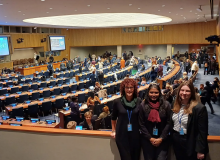
From the sex trade in Thailand and people kidnapped into cyber-scamming in Myanmar to forced labor in tourist centers, human trafficking is one of the world’s most widespread injustices.
.jpg)
Thousands of people in Austria's second largest city mourn the deaths of seven students and three teachers at a secondary school, killed by an armed young man who later committed suicide.
.jpg)
This experience certainly inspires us to return to our communities with renewed enthusiasm and vision, knowing that we are not alone in our journey and the challenges we face.

In Paris, participation reached a new record, with between 40,000 and 50,000 participants. There were also marches in Guadeloupe and French Guiana.
.jpg)
We spoke in Berlin with Päivi Räsänen, the Finnish parliamentarian awaiting the outcome of a trial for publicly expressing her Christian beliefs. “I see a real threat to freedom. That’s why I always encourage Christians to make use of the rights we still have: freedom of speech, freedom of religion”.
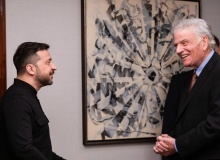
The second day of the European Congress on Evangelism focused on the importance of trusting the Bible. Persecuted Christians from Africa and Middle East shared their testimonies, as participants prayed for the Ukraine war after Franklin Graham met Zelenskyy.
.jpg)
The National Assembly backed the bill, but the law supported by President Macron may not be passed before 2027. Evangelicals among those who warn against the “removal of basic protections” for human dignity.
.jpg)
The Ukrainians who travelled to Wisła, Poland, to attend the ELF conference did not talk about numbers. They shared stories about children suffering from vicarious trauma, regular Christians praying with soldiers on the front line, and the resilient action of churches serving displaced families.

In Germany, Franklin Graham emphasised the power of the gospel to change history. The European Congress on Evangelism began with more than 1,000 participants from 55 countries across the continent.
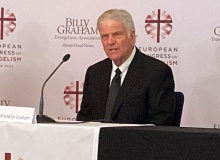
At a press conference in Berlin, the well-known evangelist addressed his relationship with US presidents and said “prayer is key” to end the war in Ukraine and bring reconciliation.
.jpg)
More than 350 Baptists, Pentecostals, Brethren and Charismatics gathered in Prague with the aim of deepening relations between evangelical churches in this strongly secularised Central European country.
.jpg)
The gut feeling of many Europeans – and certainly that of many Swedes – is pointing them in the wrong direction.
.jpg)
Amsterdam, with its Protestant tolerance became Europe’s most important printing hub in the 17th century. Exiles and intellectuals flocked to the city because of its freedom to print and disseminate new ideas—further boosting its international soft power.
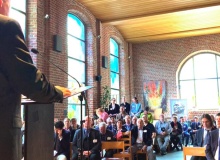
Divorced from its Christian roots, Schuman warned, democracy would degenerate into anarchy or tyranny, a process we see unfolding before our very eyes right now.
.jpg)
Evangelicals in France have been reflecting for years on the dignity of people at the end of their lives. Thierry Le Gall, who works with the CNEF in political circles, explains his point of view on the new assisted suicide law that is about to be voted on.
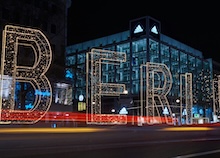
The Congress expects to welcome 1,000 European leaders from over 55 countries. “One of my grandfather’s most enduring legacies was his burden to help equip other evangelists”.
.jpg)
A report from the ground with highlights from this year's Portuguese Evangelical Forum.
.jpg)
Discipleship, Arts, Media, Youth work, Emerging Leaders and Muslim Ministry among the 31 networks at the European Leadership Forum 2025. Plenary sessions with speakers such as Peter J. Williams, Rico Tice and Zefjan Nikolla, streamed live.
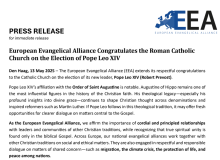
The European Evangelical Alliance also emphasises in a statement that “true spiritual unity is found only in the biblical Gospel”.

The ‘La Place’ event in Paris brought together over two hundred Christian organisations. ‘From words to action’ was the theme of a meeting that addressed all kinds of issues from a biblical perspective.
.jpg)
Scottish parliament will hold a first vote on 13 May. Christians are calling for the voices of palliative care doctors, people with disabilities and the most vulnerable to be heard.
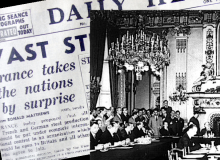
Headlines the world over last Friday announced the new pope, Leo XIV. Headlines 75 years ago on May 10, 1950, announced a new audacious plan for peace: ‘France takes the nations by surprise’, ‘Schuman bomb’.

Las opiniones vertidas por nuestros colaboradores se realizan a nivel personal, pudiendo coincidir o no con la postura de la dirección de Protestante Digital.